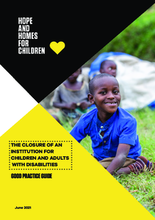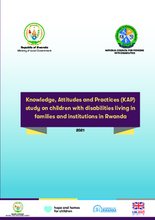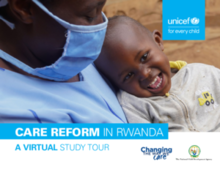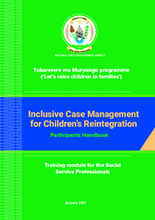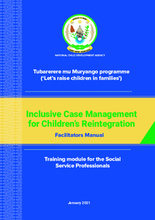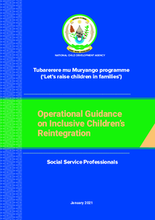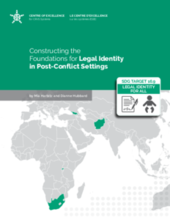This country page features an interactive, icon-based data dashboard providing a national-level overview of the status of children’s care and care reform efforts (a “Country Care Snapshot”), along with a list of resources and organizations in the country.
demographic_data
childrens_living_arrangement
children_living_without_bio
adoption
social_work_force
key_stakeholders
Key Stakeholders
Add New DataOther Relevant Reforms
Add New Datadrivers_of_institutionalisation
Drivers of Institutionaliziation
Add New Datakey_research_and_information
Key Data Sources
Add New DataReport on National Assessment of Centres caring for Children with Disabilities in Rwanda
National Integrated Child Rights Policy
Country Care Review: Rwanda
Prevalence and number of children living in institutional care: global, regional, and country estimates
The Way Forward Project Report
Community-Based Child Protection Mechanisms in Refugee Camps in Rwanda: An Ethnographic Study
Displaying 41 - 50 of 191
This is a video recording from the webinar: Constructing the foundations for legal identity in post conflict situations. This webinar shared findings from research that documents how Afghanistan, Georgia, Rwanda and South Africa have made registration of vital events more accessible by adjusting or removing legal and institutional obstacles in post-conflict settings.
This document outlines 5 key steps that serve as an effective blueprint for a successful reintegration process of children and disabilities. These include ‘engagement’, ‘Assessment’, ‘Design & Development’, ‘Transition’, and ‘Monitoring & Evaluation’.
This report presents the findings from the National Survey of Residential Centres for Children with Disabilities in Rwanda. The survey aimed at gathering comprehensive and disaggregated data related to residents’ characteristics, staff profile, and the minimum standards for the centres.
This study is part of the response to the global call for the provision of quality alternative family-based care and prevention of family separation for children with disabilities. The study is premised on the view that the knowledge, attitudes, and practices regarding the attributes assigned to, and the conceptualization of, children with disabilities in their families and communities, vis-à-vis institutional care for children with disabilities, are also crucial determinants of barriers/ enablers of full and meaningful integration of children with disabilities into community life in Rwanda.
This virtual study tour aims to provide you with a strong understanding of care reform in Rwanda
from the comfort of your own home.
This participant’s handbook relates to Module 3 of the Government of Rwanda’s Tubarerere Mu Muryango (TMM) training programme. It is for Child Protection and Welfare Officers who work directly with children and families on reintegration of children, including children with disabilities from residential institutions.
This training package is primarily for Government of Rwanda’s Child Protection and Welfare Officers who work directly with children and families on reintegration of children (including children with disabilities) from residential institutions.
This operational guidance describes how the Government of Rwanda conducts case management for reintegration of children from residential institutions to family-based care, including children with disabilities.
This paper aims to contribute to the achievement of Target 16.9 under Sustainable Development Goal 16 by analyzing the role of the civil register and the legal underpinnings for identity in four countries: Afghanistan, Georgia, Rwanda, and South Africa. It describes institutional and operational models in each country that support universal registration of births, deaths, and other vital events.
The overall objective of this technical assistance is to increase the understanding of child protection (CP) among health professionals and establish appropriate linkages between health and CP professionals to respond to health emergencies

